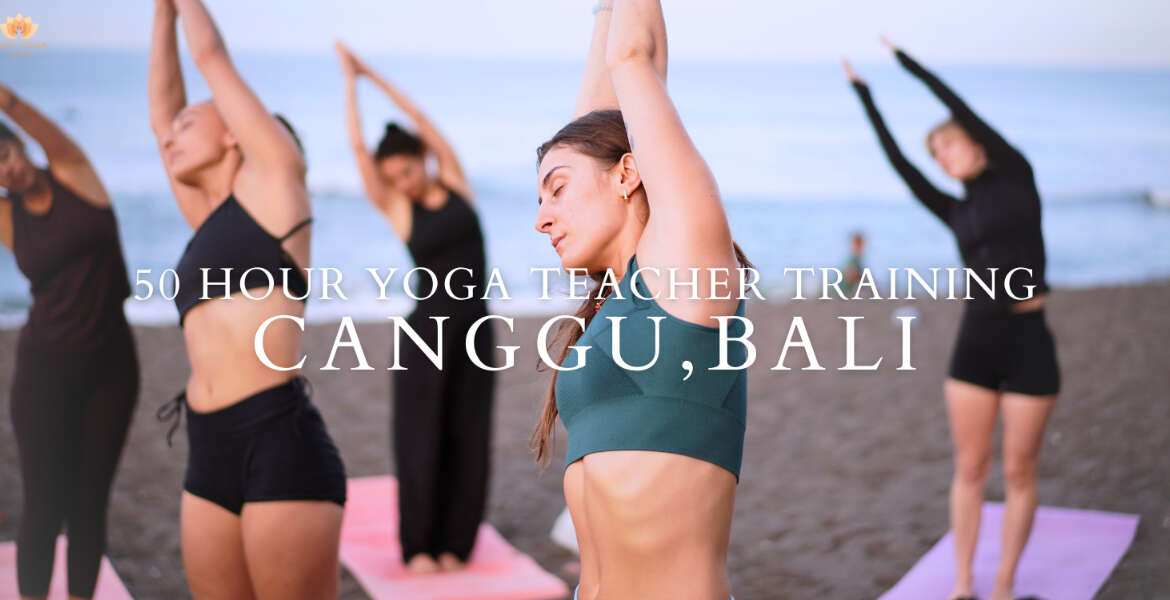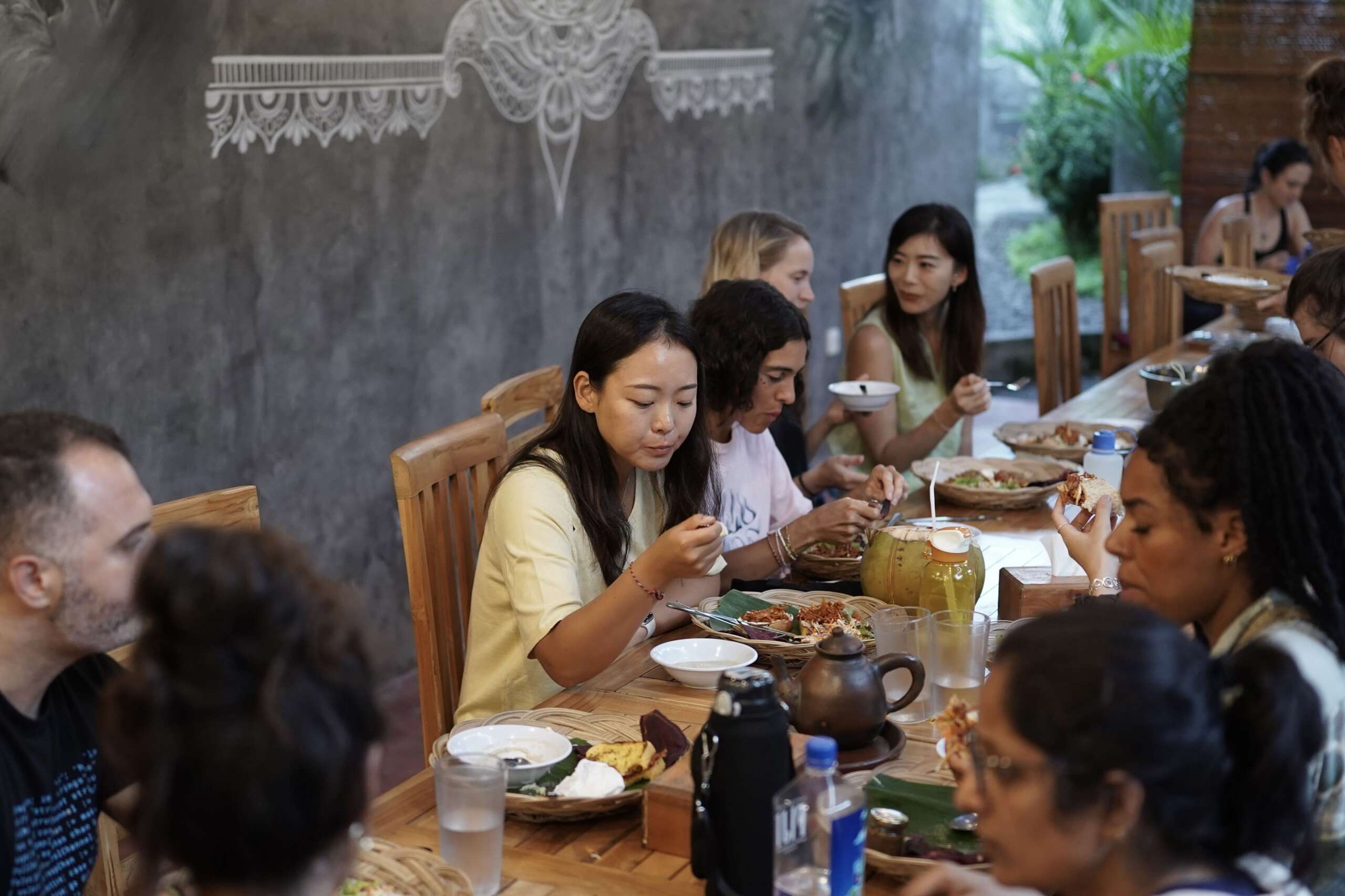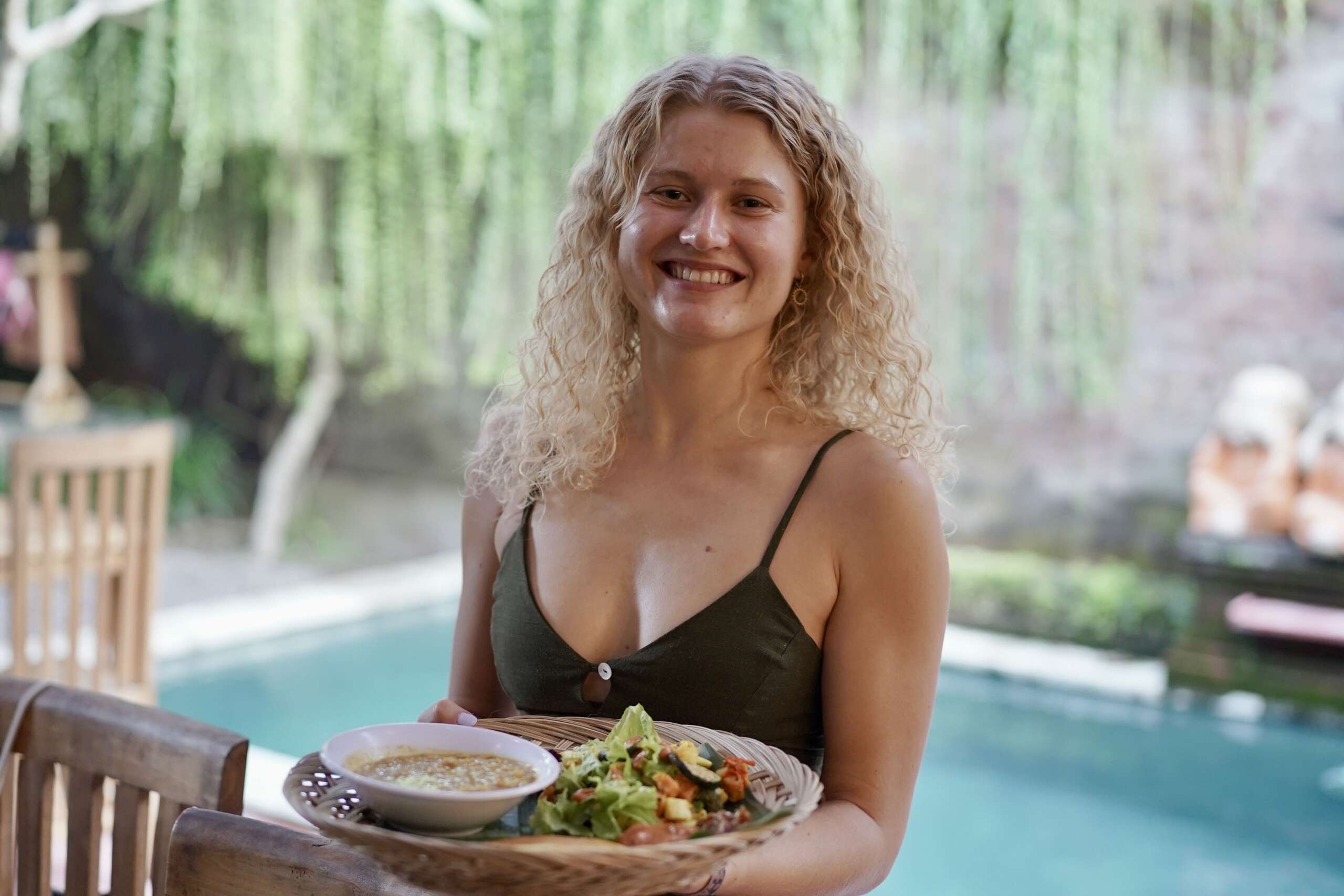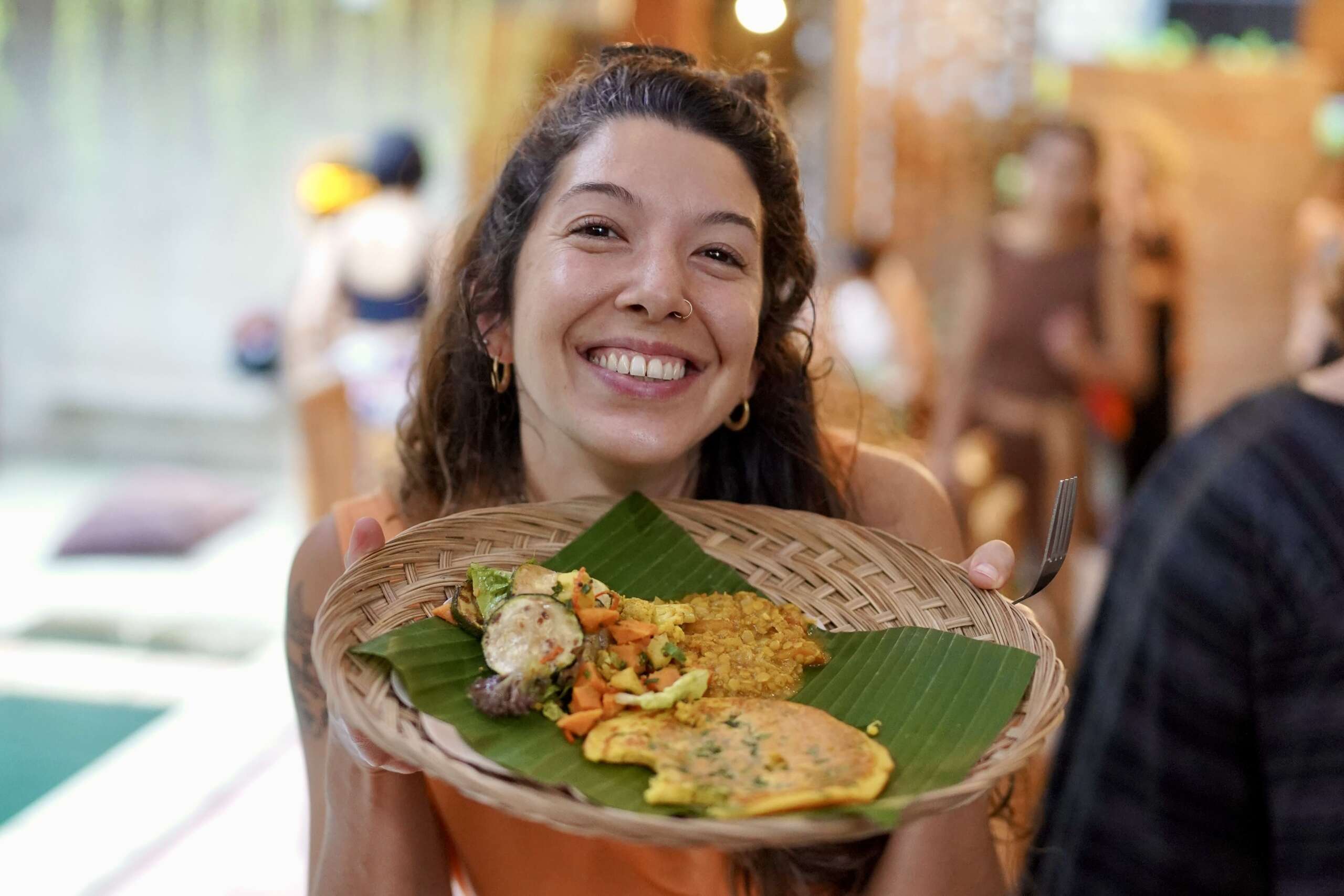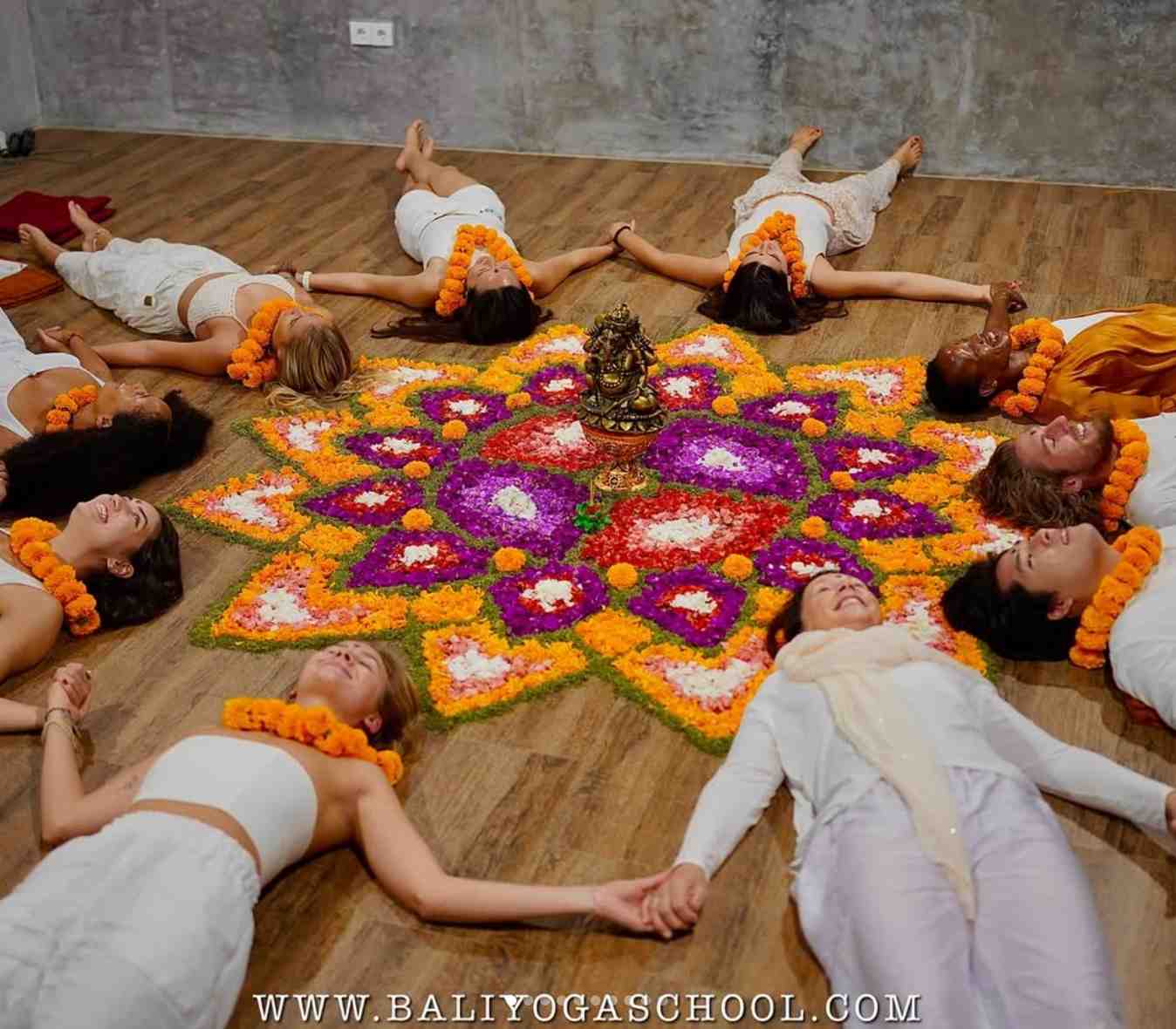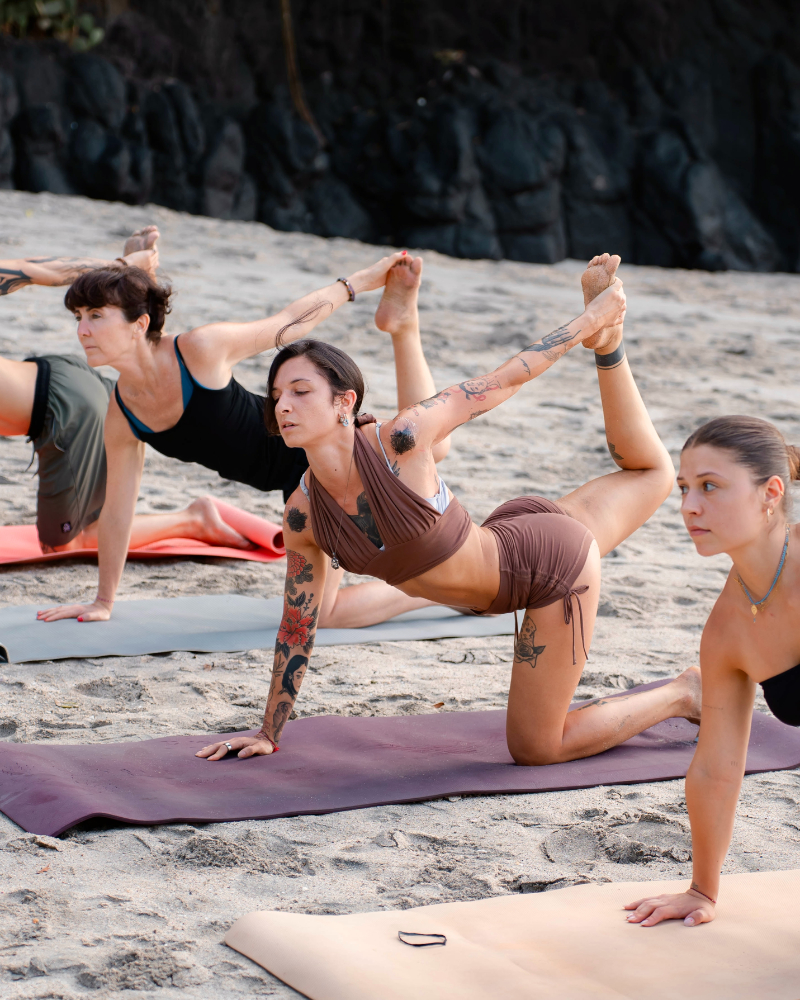Canggu is not just a destination; it’s an experience. The town’s vibrant cafes, boutique shops, and world-class yoga studios create an atmosphere that perfectly balances energy and serenity. At Bali Yoga School, we combine this natural harmony with structured learning – offering an immersive environment where students can focus, breathe, and grow. Our 50 Hour Yoga Teacher Training forms the first segment of the 200-hour yoga teacher training bali certification pathway. It covers essential topics such as: Asanas (Postures) — Alignment, benefits, and safety techniques / Pranayama (Breathwork) — Understanding the power of conscious breathing / Meditation & Mantra Chanting — Developing focus and mindfulness / Teaching Methodology — Foundations of safe and effective instruction / Yoga Philosophy (Darshana) — Exploring the roots and purpose of yoga / Anatomy & Physiology – Crucial for effective and safe practice of yoga asanas.
Our experienced teachers bring together ancient yogic wisdom and modern teaching techniques, ensuring that every class supports both the mind and body. Whether you’re a beginner or a seasoned practitioner, this program encourages personal reflection, self-discipline, and growth. Many students describe this course as “life-changing” – not just because of the yoga itself, but because of the community and energy it fosters. You’ll connect with fellow yoga enthusiasts from around the world, forming bonds that often last a lifetime.
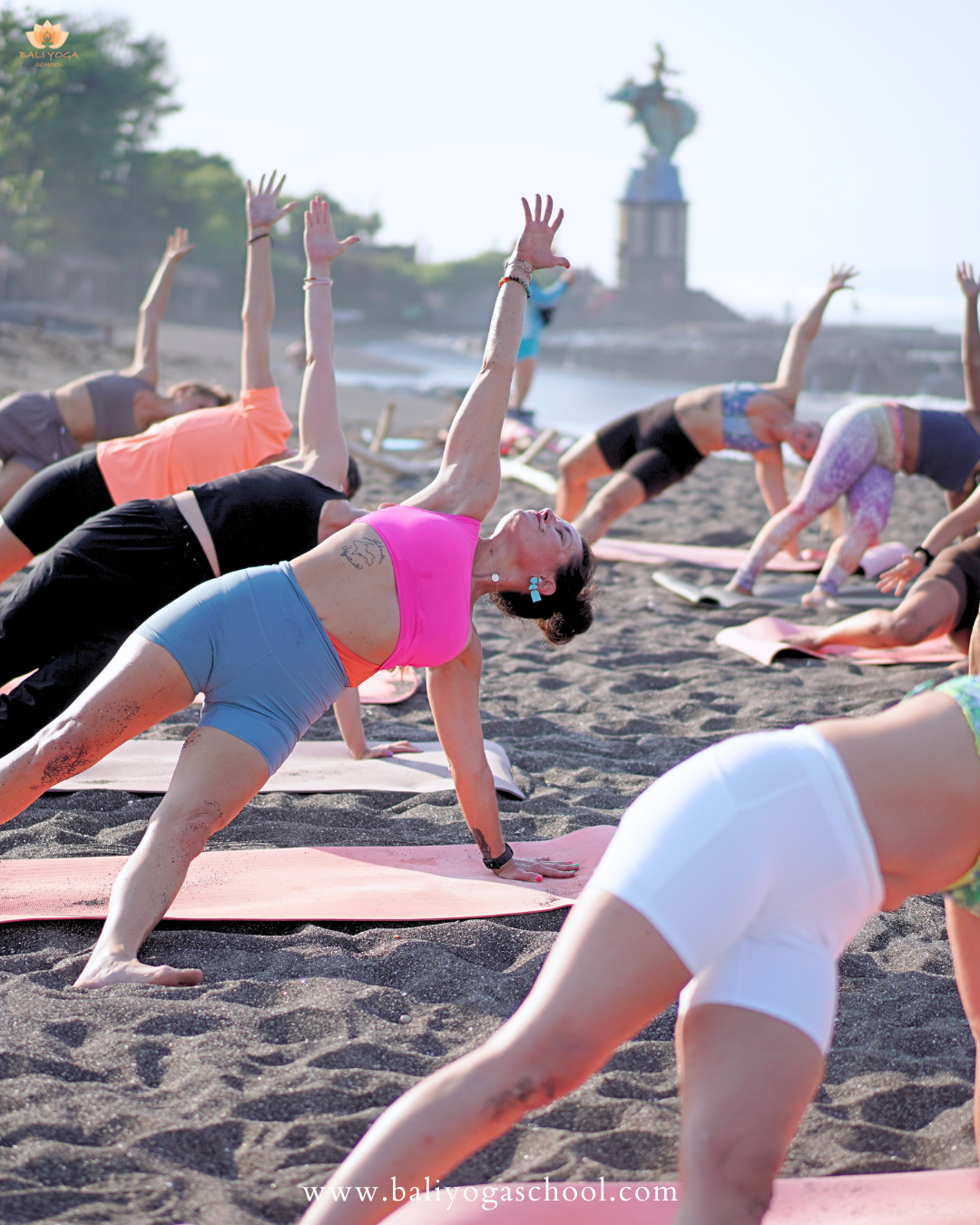
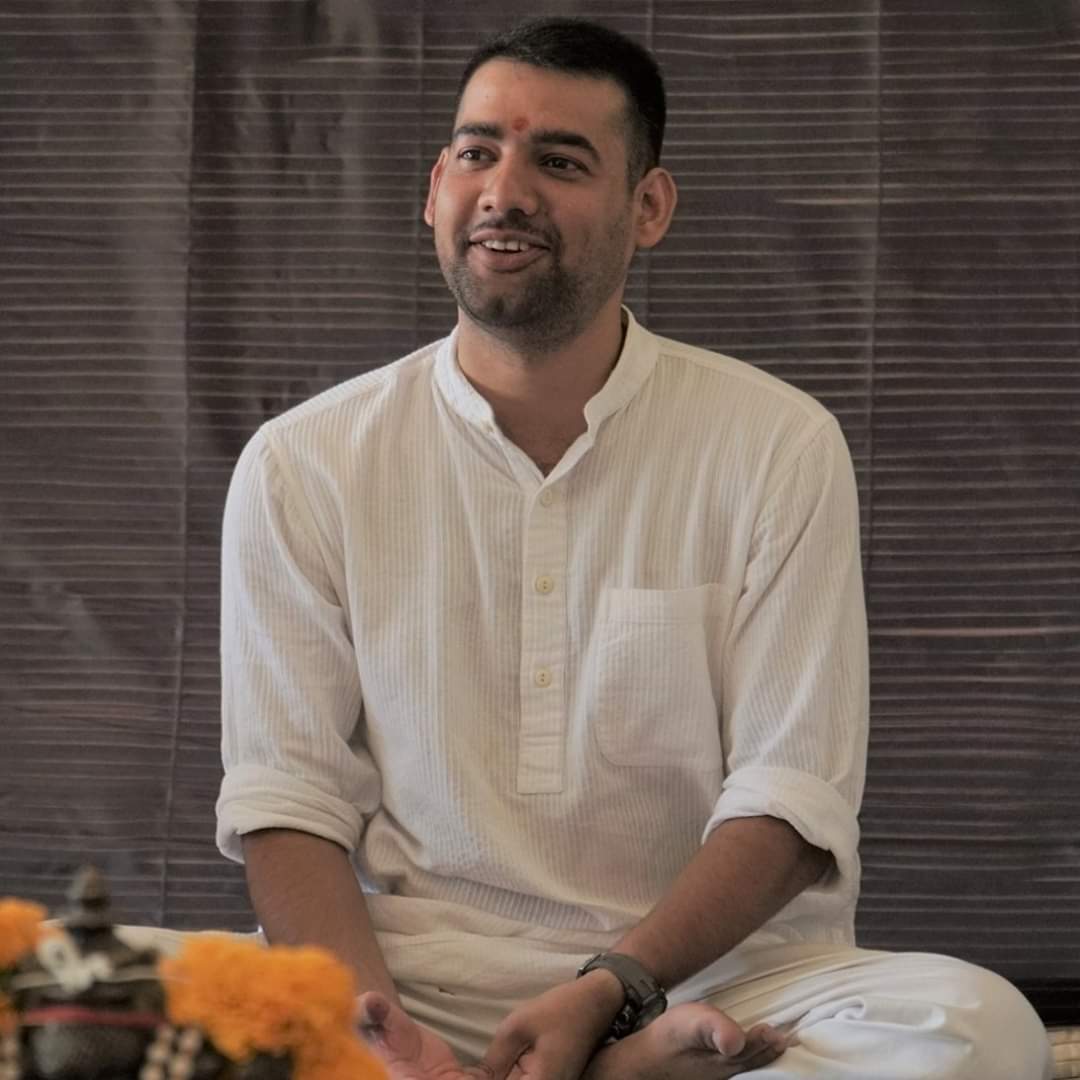
Founder of Bali Yoga School
Yogi Himanshu
Everything you experience at Bali Yoga School community has come from our great leader, Yogi Himanshu Joshi. He is the most honest, hard-working, authentic person we can ever meet. His yoga journey started from a severe injury after playing sports for a long time at the state / national level. Yoga brought him up into the light from the darkness.
He contributed to the success of other yoga schools in Rishikesh, and then built his own — Himalayan Yoga Association and Bali Yoga School. He continues to expand the community, uplifting lives for the better. Feel his essence in every detail of the school and learning.
Read MoreOur Yoga Teachers

Yogini Shanti
Yoga Philosophy / Meditation — Born in a Balinese yogic family, Shanti studied at S-VYASA University and shares the depth of pranayama and meditation with compassion.

Yogini Nikki
Ashtanga Vinyasa Yoga — Through her journey of healing scoliosis, Nikki brings movement, nutrition, and spiritual growth together for a mindful practice.

Yogini Chiara
Hatha / Vinyasa / Sound Healing — Chiara’s creative flow unites Vinyasa, Yin, and sound therapy, inspiring harmony in body and soul.

Yogi Pandu
Philosophy / Pranayama — A Vedic scholar from Banaras Hindu University, Pandu shares timeless yoga philosophy through simple, powerful wisdom.
Our Yoga Certifications
Bali Yoga School is globally recognized for authentic yoga education and certified by leading yoga organizations worldwide. Our certifications represent integrity, professionalism, and spiritual excellence.
-
Yoga Alliance 200 hrs Certificate
Begin your teaching journey with this foundational course, accredited by Yoga Alliance USA.
-
Yoga Alliance 300 hrs Certificate
Advance your yoga expertise with deeper studies in teaching methodology and yogic sciences.
-
IYS®️ - International Yoga School Certification
Recognizing Bali Yoga School for international standards in authentic yoga education.
-
IYS®️ Recognition
Exclusive IYS®️ certification acknowledging Bali Yoga School as a globally registered yoga institution.
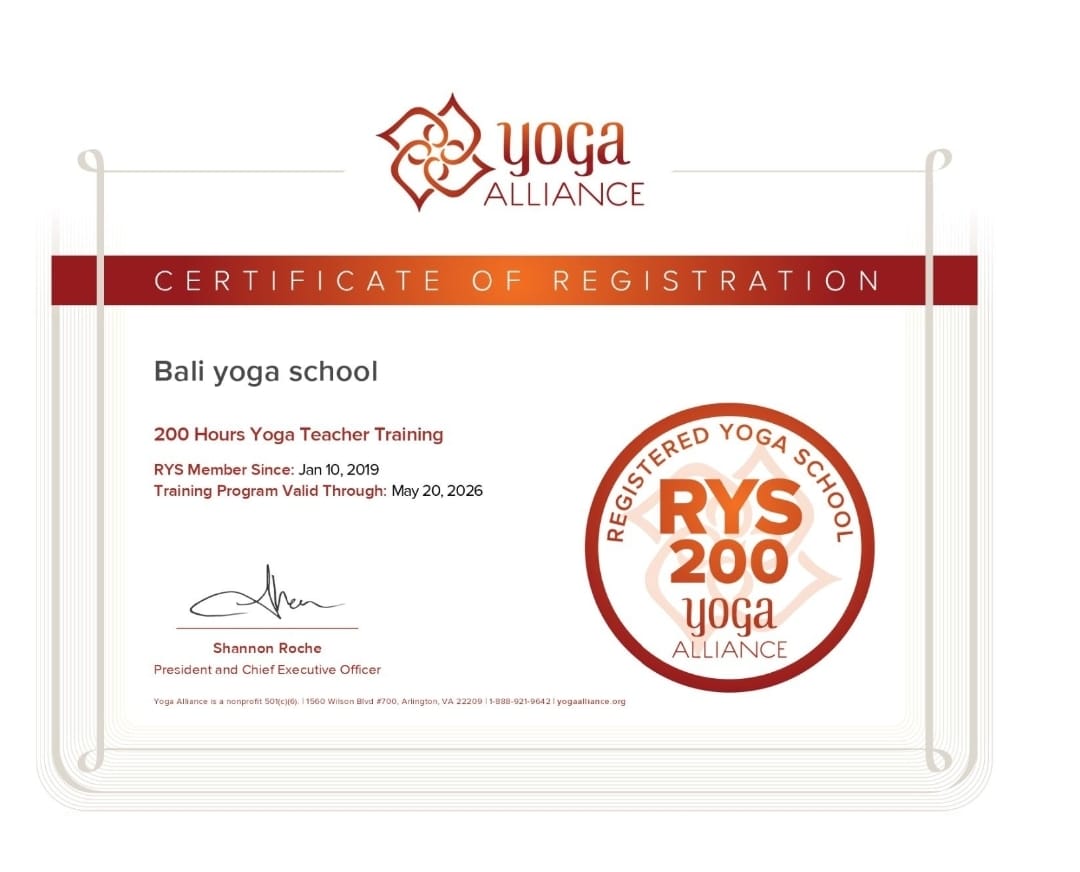
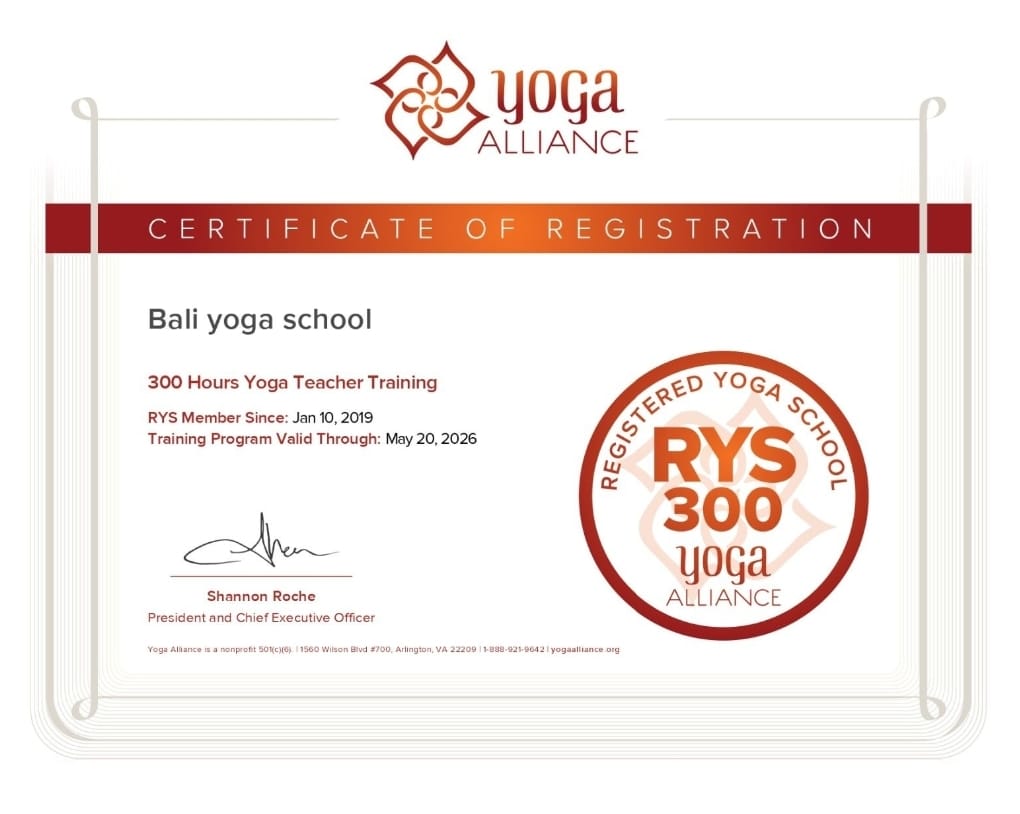
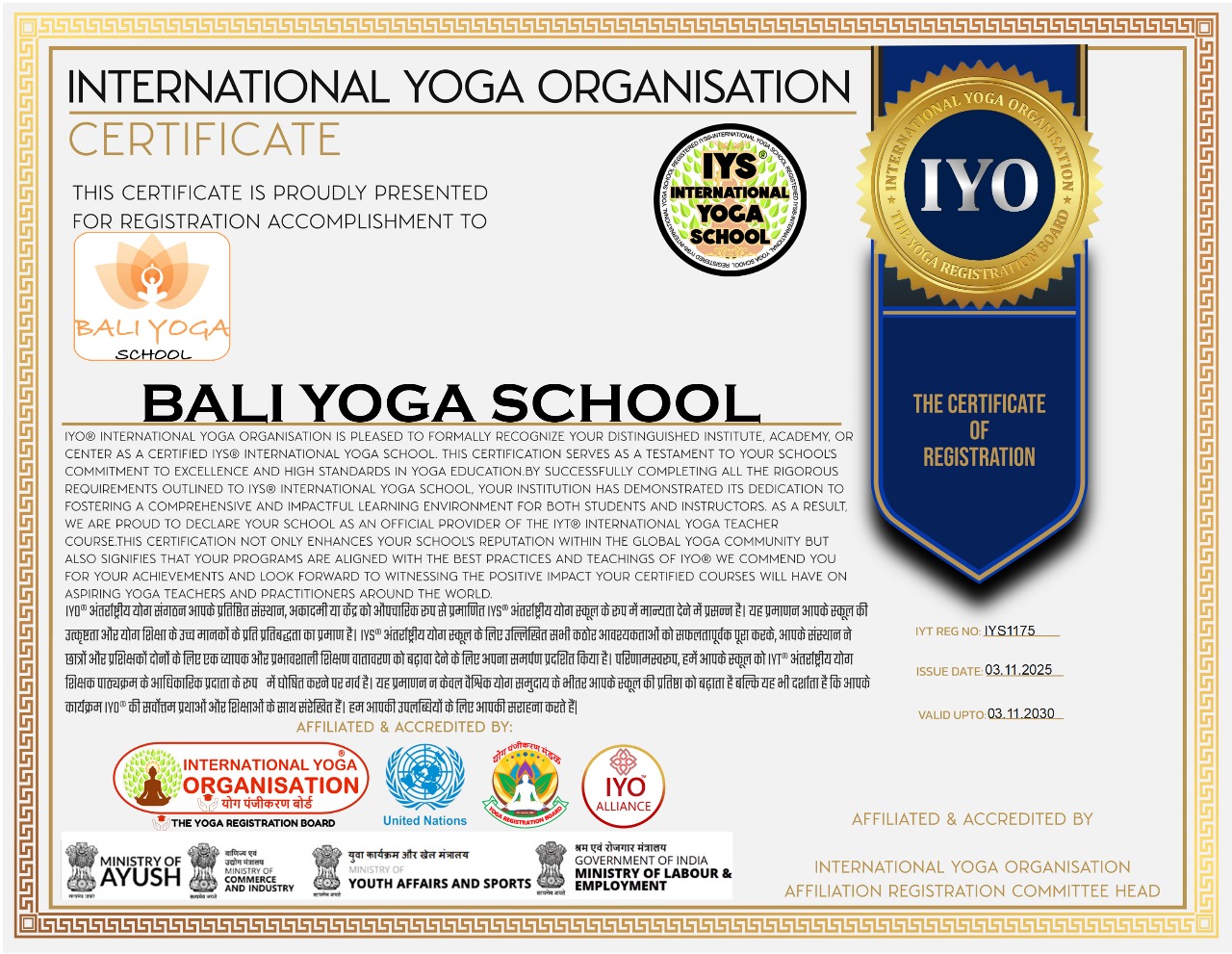
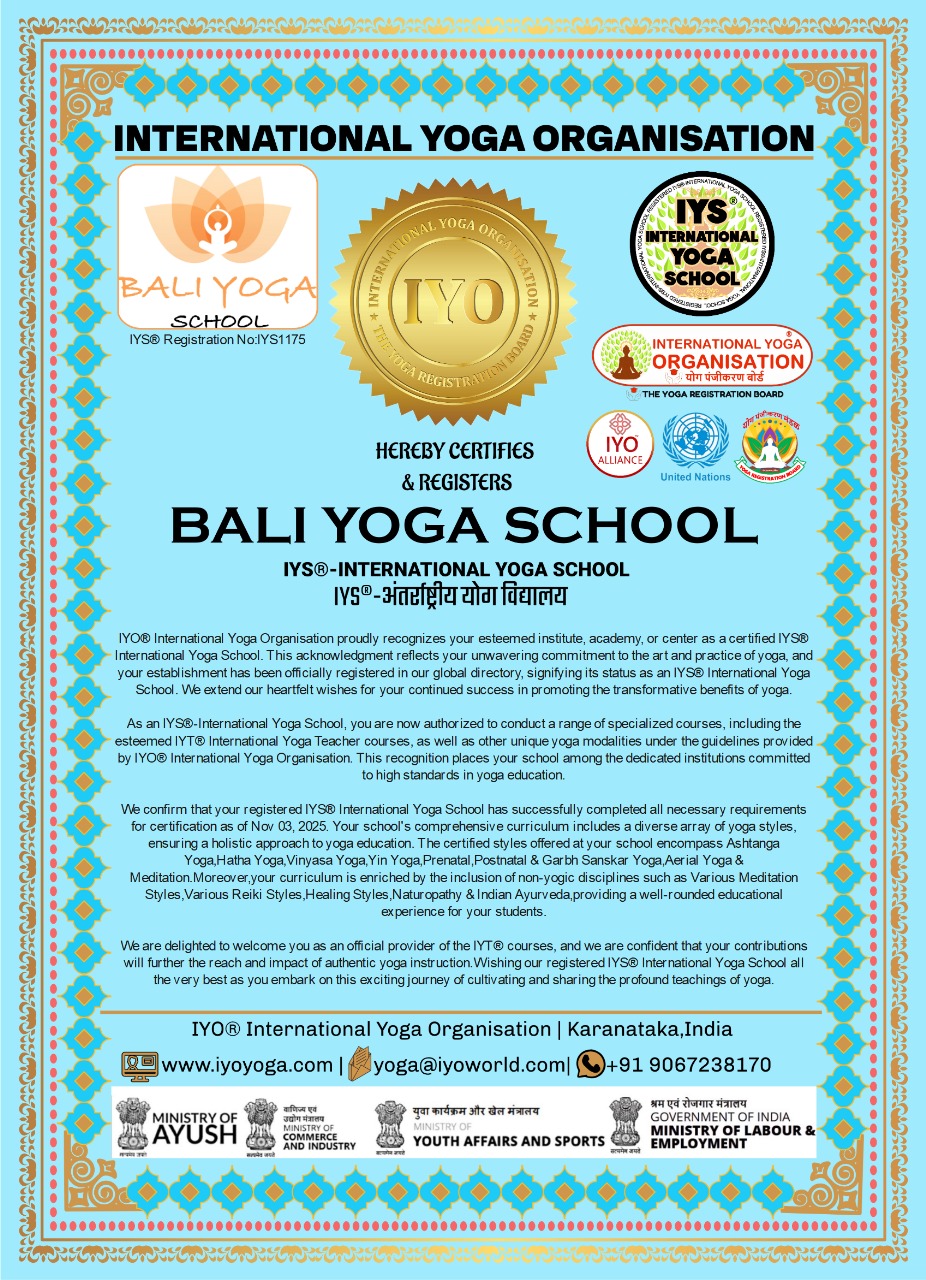
Bali Yoga School Offers
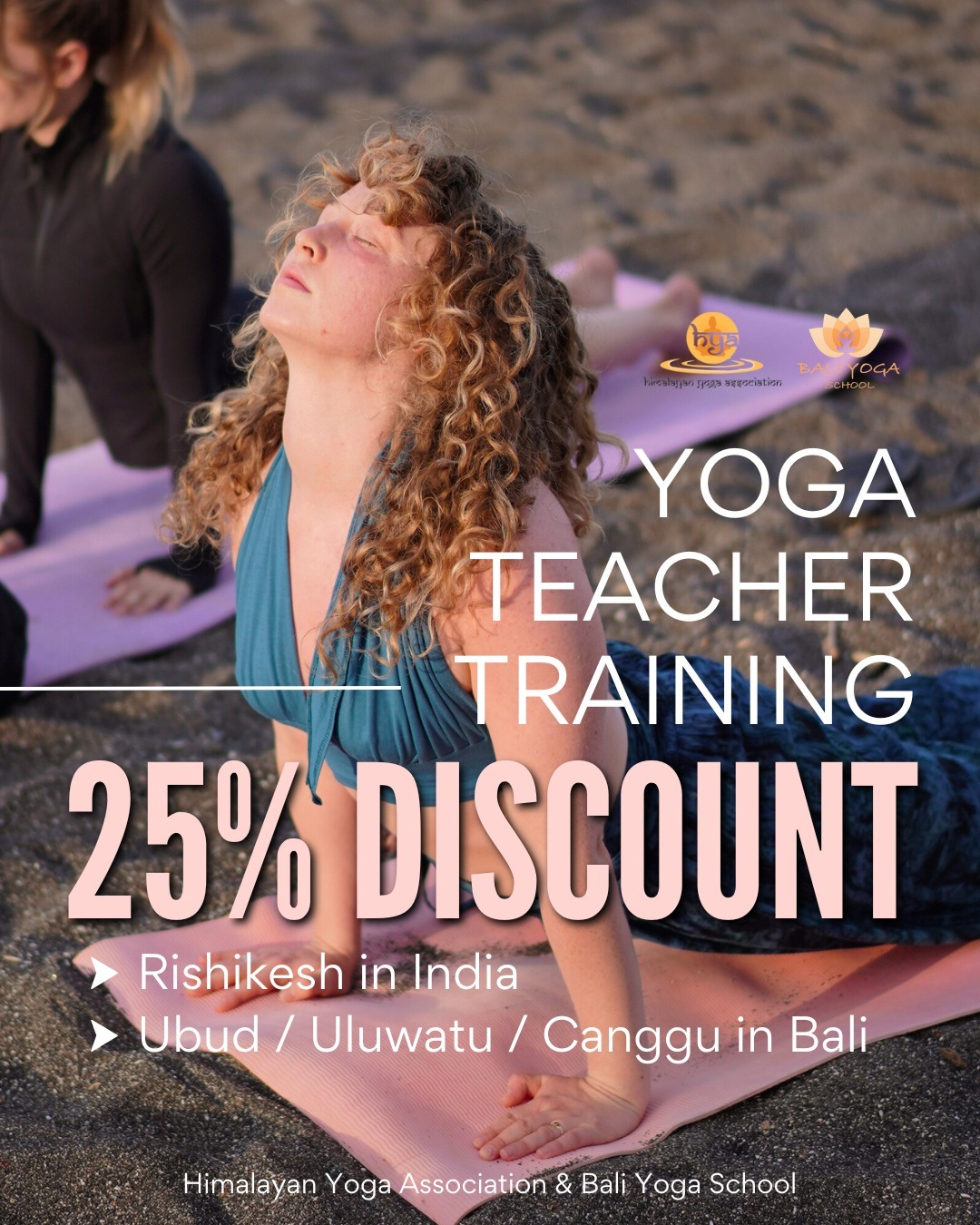


50 Hour Yoga Teacher Training in Bali - Course Syllabus
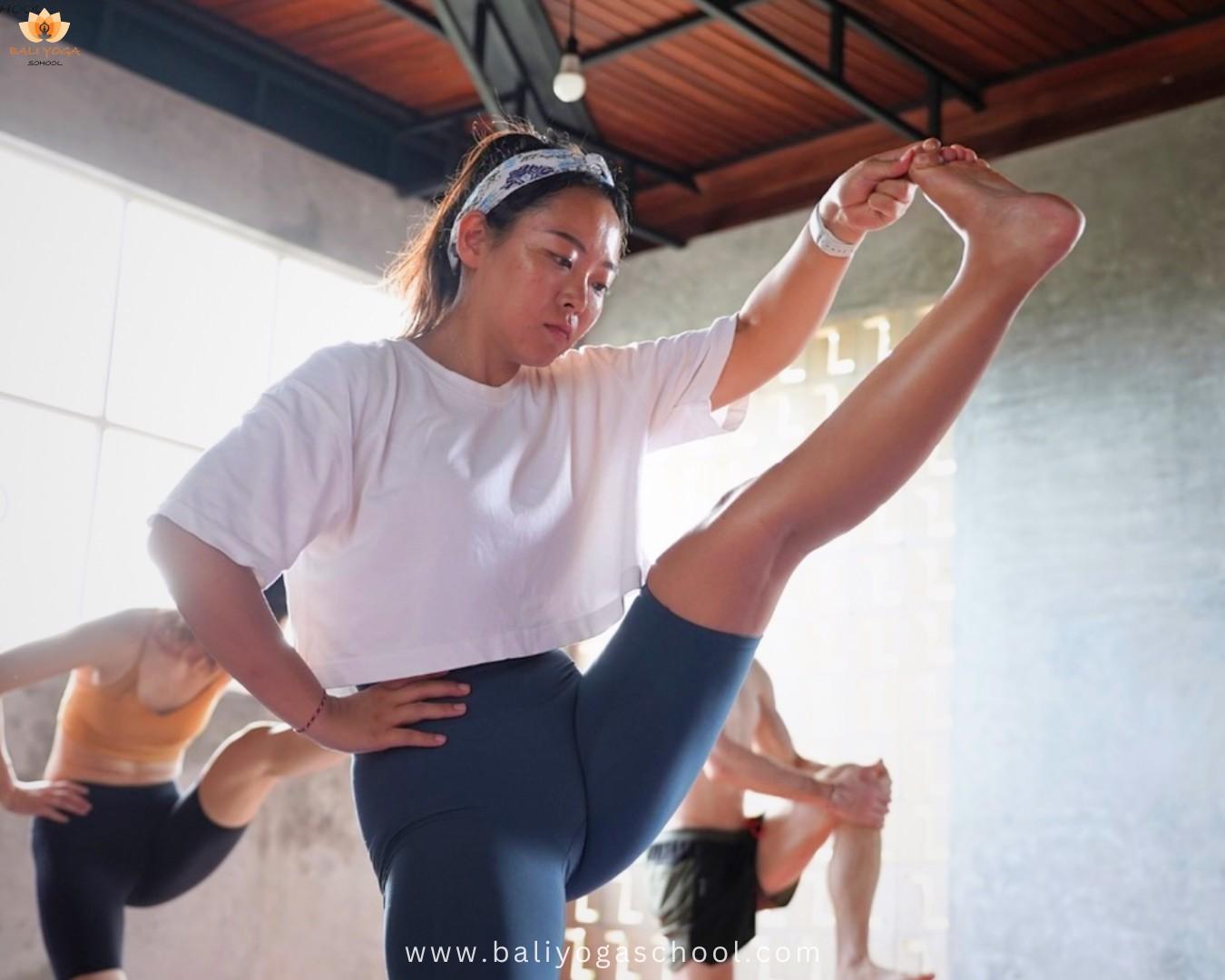
Ashtanga Vinyasa Yoga
What is Ashtanga Vinyasa Yoga / Its History
Introduction to Ashtanga Vinyasa Yoga
Opening Sequence
Samasthitiḥ
Surya Namaskar A
Surya Namaskar B
Standing Sequence Asanas
Pādaṅguṣṭhāsana
Pādahastāsana
Utthita Trikoṇāsana
Parivṛtta Trikoṇāsana
Utthita Pārśvakoṇāsana
Parivṛtta Pārśvakoṇāsana
Prasārita Pādottānāsana A
Prasārita Pādottānāsana B
Prasārita Pādottānāsana C
Prasārita Pādottānāsana D
Use of yoga props
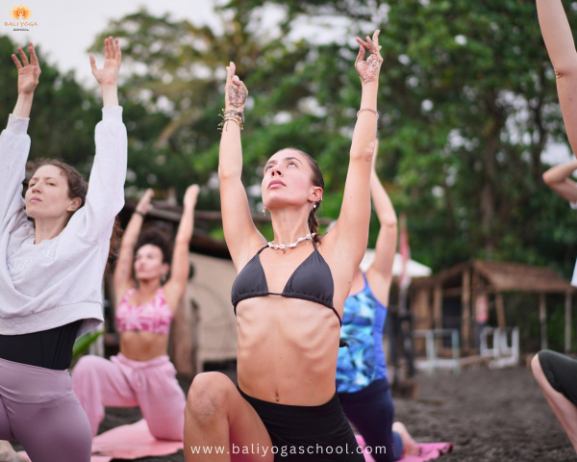
Hatha Yoga / Vinyasa
Philosophy of Hatha Yoga
Ancient Scriptures of Hatha Yoga
Aim and Objectives of Hatha Yoga
Surya Namaskar
– (Pranamasana)
– (Hasta Uttanasana)
– (Padahastasana)
– (Ashwa Sanchalanasana)
– (Dandasana)
– (Ashtanga Namaskar)
– (Bhujangasana)
Chandra Namaskar
– (Ardha Chandrasana)
Shashankasana
Supta Vajrasana
Shashank Bhujangasana
Marjari-asana & Bitilasana
Vyaghrasana
Anahatasana
Urdhva Mukha Pasasana –
Ardha Ushtrasana
Ushtrasana
Naman Pranamasana
Virabhadrasana 1
Virabhadrasana 2
Virabhadrasana 3
Virabhadrasana 4
Baddha Virabhadrasana
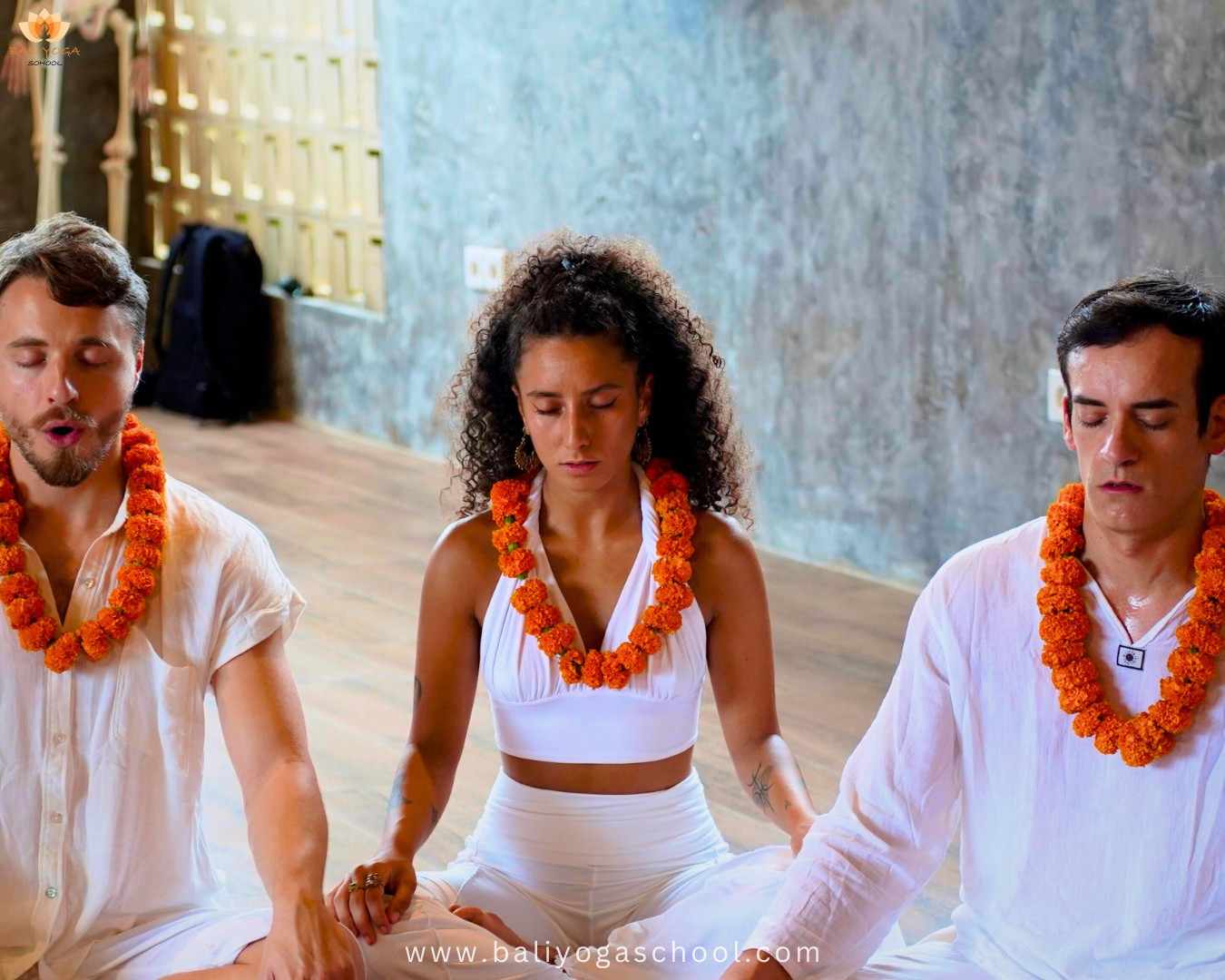
Meditation Practices
What is meditation and what is not
History of meditation
3 Best postures for meditation
(Quarter lotus / Half lotus / Full lotus)
Om meditation
Shiva mantra aeditation (Om Namah Shivaya)
Breath awareness (Anapana)
Chakra meditation
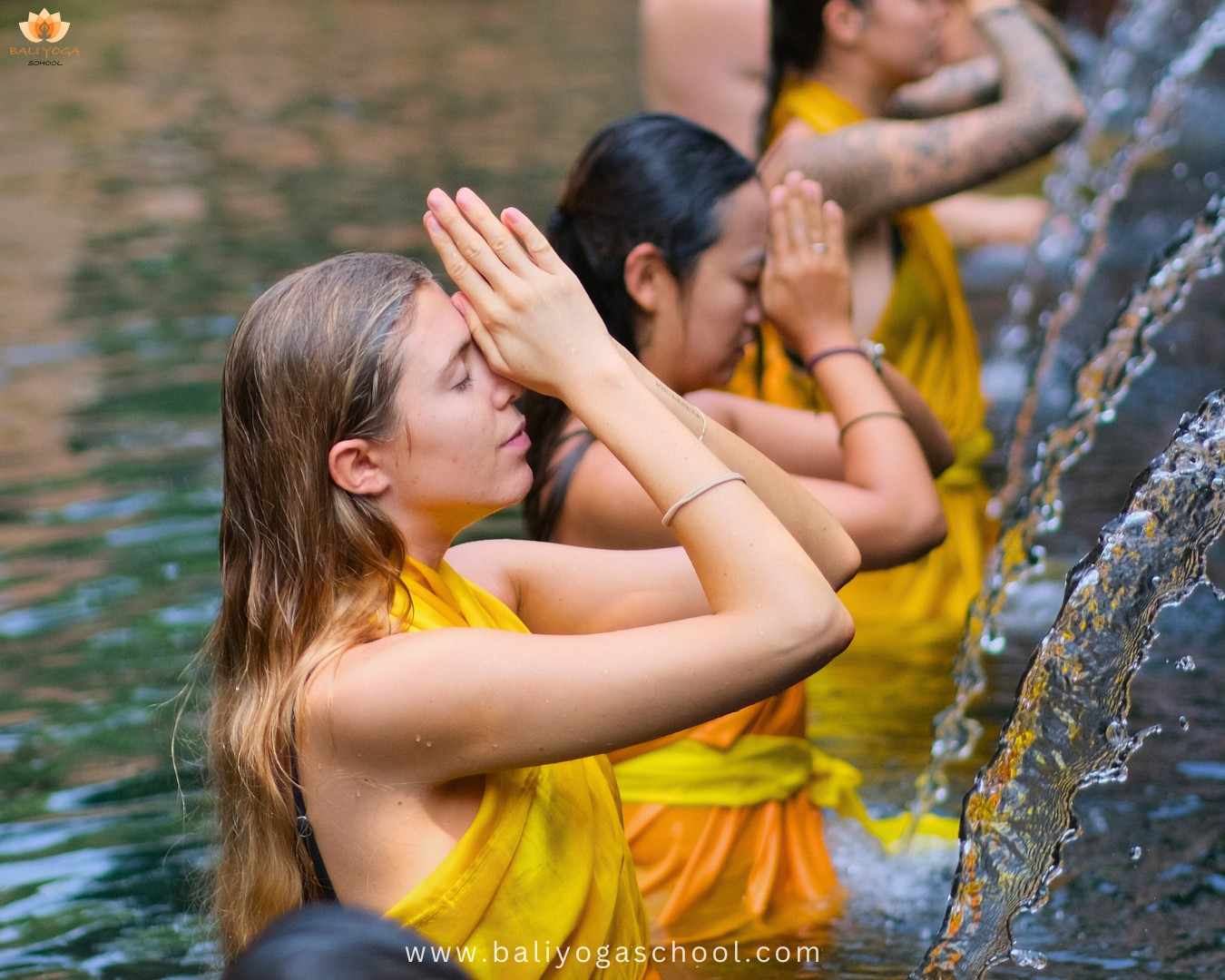
Yoga Philosophy (Yoga Darshana)
What is Yoga? Meaning of Yoga & Goal
Three kinds of pain (three-fold misery)
History of Yoga
Classical & Modern Yoga
Patanjali Yoga Sutras (classical text of Yoga)
An overview of all chapters on Patanjali Yoga Sutras
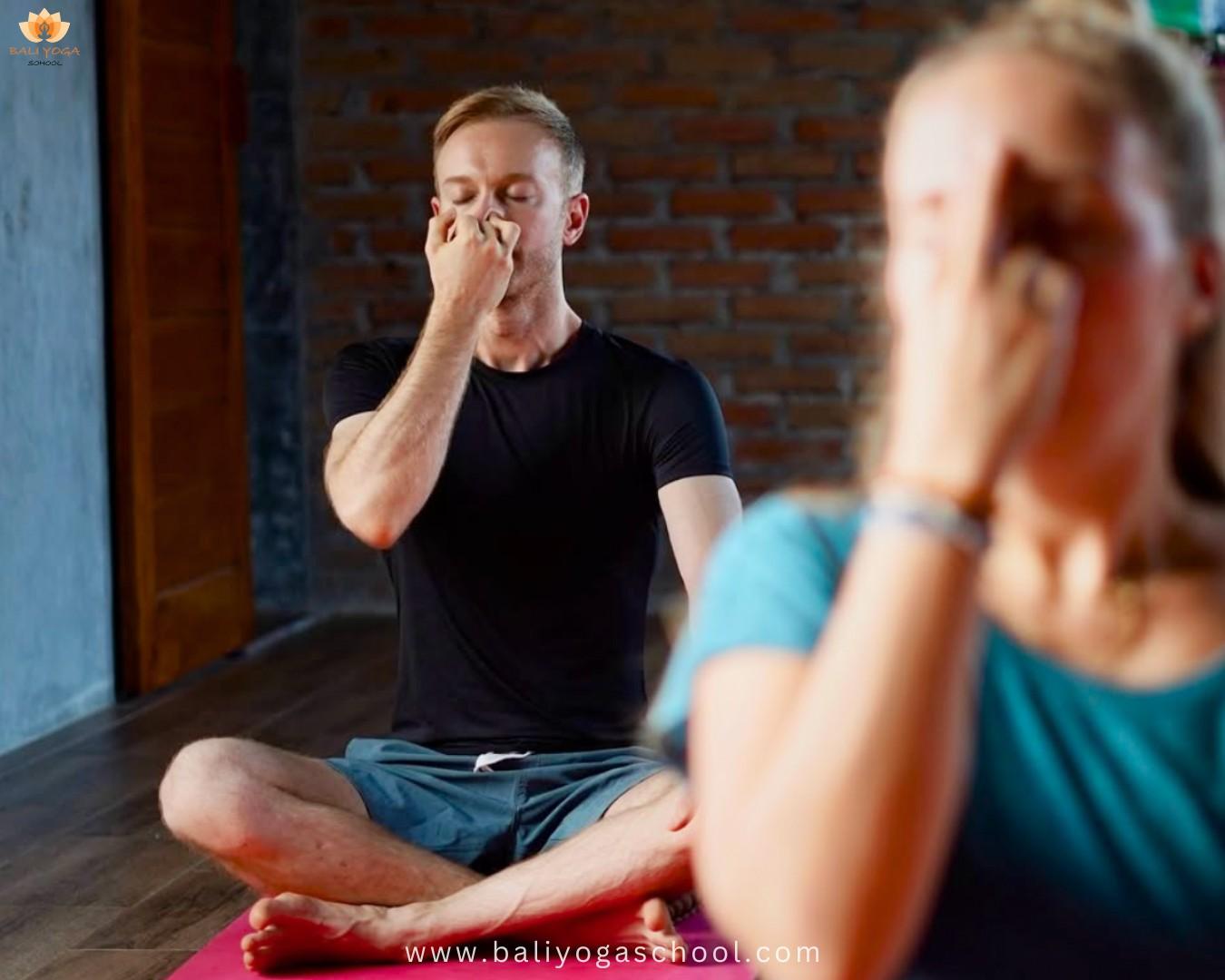
Pranayama (Breathing Practices)
What is pranayama / Its benefits
3 best postures for pranayama
(Quarter lotus / Half lotus / Full lotus)
Clavicular Pranayama
Thoracic Pranayama
Diaphragmatic Pranayama
Yogic Pranayama
Nadi Shodhana Pranayama
Kapalbhati Pranayama

Yoga Anatomy & Physiology
Introduction to body
Body planes, directional terms
Human cells, tissues, organs
Human skeletal system
Types of joints
Body movements
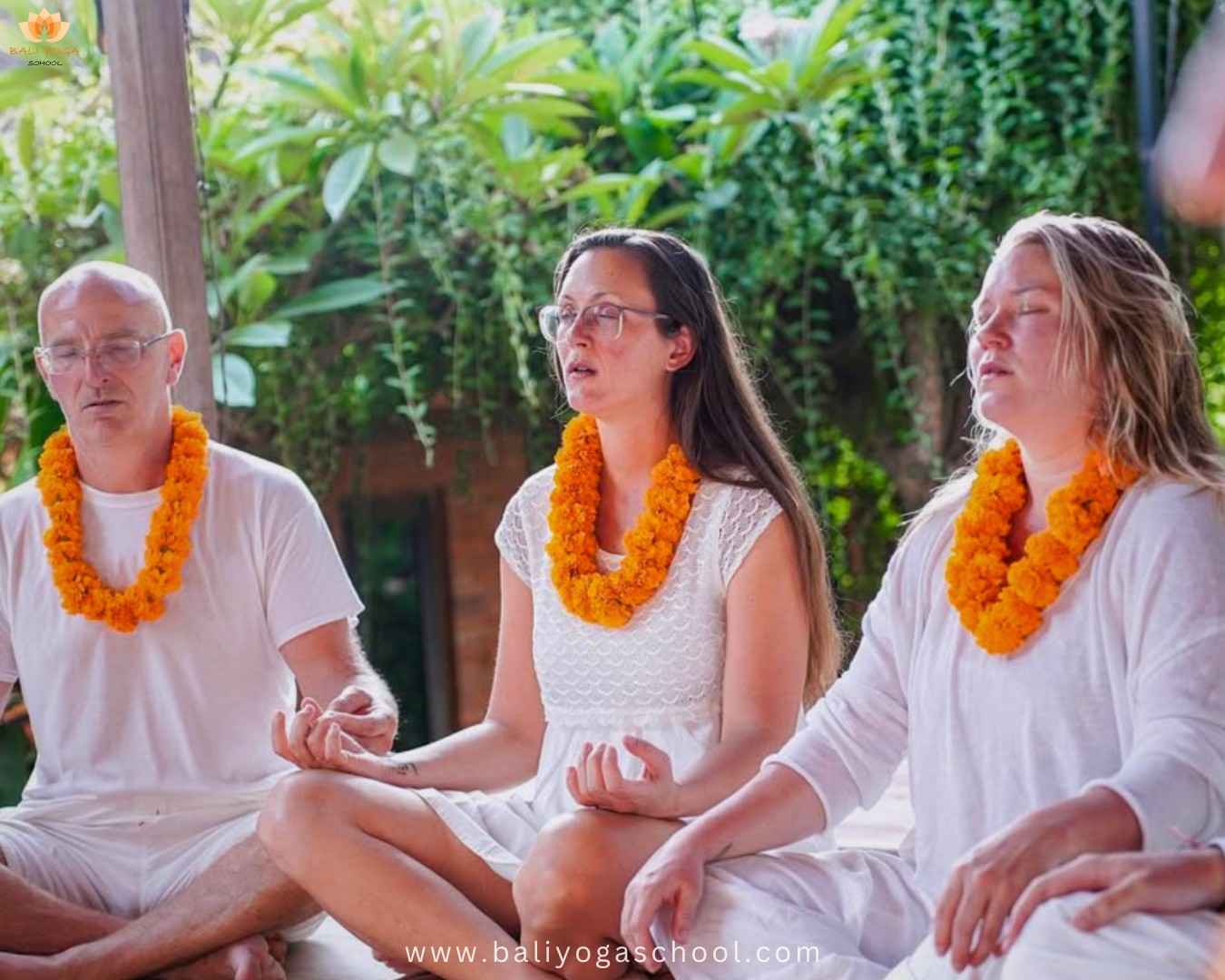
Mudras (Yoga Gestures)
Jnana mudra
Chin mudra
Yoga Bandhas (Energy Lock)
Uddiyana
Jalandhar
Yoga Cleansing (Shatkarma)
Jalaneti
50 Hour Yoga Teacher Training Daily Schedule
| Time | Schedule |
|---|---|
| 5:30 Am | Morning Bell |
| 6:00 - 7:00 Am | Shatkarma & Pranayama |
| 7:00 - 8:30 Am | Hatha/ Vinyasa Flow Yoga |
| 9:00 Am | Breakfast |
| 10:00 - 11:00 Am | Yoga Philosophy |
| 11:00 - 12:00 Pm | Meditation |
| 12:00 - 1:00 Pm | Alignment / Adjustment / Teaching Methodology |
| 2:00 - 3:00 Pm | Rest Time |
| 3:00 - 4:00 Pm | Yoga Anatomy & Physiology |
| 4:00 - 5:30 Pm | Ashtanga Yoga |
| 5:30 Pm | Tea Break |
| 7:00 - 8:00 Pm | Dinner |
| 9:00 Pm | Lights Off |
Arrival & Departure Dates
Our 50-hour Yoga Teacher Training in Canggu, Bali begins on the 1st of every month at 5:00 PM with an opening ceremony and orientation. The course concludes on the 6th of every month. To ensure you are well-rested before the training begins, we recommend arriving one day earlier. Check-in is available between 10:00 AM and 4:00 PM, and we offer a complimentary night’s stay before the course starts. On the final day, check-out should be completed between 12:00 PM and 2:00 PM.
How to Arrive at Bali Yoga School
The closest and most convenient airport is Ngurah Rai International Airport (DPS), Denpasar, located approximately 20 km from our Canggu campus. Once you have booked your flight, simply share your arrival details with us, and we will arrange an airport pickup.
Note: Complimentary pickup from DPS (I Gusti Ngurah Rai International Airport) is included in your course fee. Please send us your flight information after booking so we can organize your transfer smoothly..
Accommodation
All our accommodations are private rooms with A/C to make sure you get proper recovery and privacy to reflect your practice and fully renew yourself each day for your effective yoga teacher training experience. In your free-time, unwind by the swimming pool under the shining sun, or devote yourself into journaling in your peaceful private room, or exchange life stories and intakes from the day with peers. Our management team is dedicated to maintaining the highest standards of cleanliness and comfort during your stay.
View More











50 Hour Yoga Teacher Training in Canggu Bali – Dates and Fees
-
3rd to 10th Jan 2026
Available
-
1st to 8th Feb 2026
Available
-
1st to 8th Mar 2026
Available
-
1st to 8th Apr 2026
Available
-
1st to 8th May 2026
Available
-
1st to 8th Jun 2026
Available
-
1st to 8th July 2026
Available
-
1st to 8th Aug 2026
Available
-
1st to 8th Sep 2026
Available
-
1st to 8th Oct 2026
Available
-
1st to 8th Nov 2026
Available
-
1st to 8th Dec 2026
Available
50 Hours Yoga Teacher Training Course Fees – 25% Discount
| Room Type | Discounted Price | Original Price | Book Now |
|---|---|---|---|
| Private Room 25% OFF | $1125 USD | Enroll Now | |
| Course + Meals (No Room) 25% OFF | $800 USD | Enroll Now | |
| Course Only (No Room / Meals) 25% OFF | $560 USD | Enroll Now |
Bali Yoga School Dining
We Bali Yoga School believe that food is a sacred expression of care and one of the ways to enhance our spirit. We serve is plant-based meals, prepared with the highest standards of hygiene, cleanliness, and love to support your yoga journey. One of the primary practices in yoga is ahimsa, meaning non-violence. By following a plant-based diet during your training, you are in the practice of ahimsa. Yoga is a way of living, and we bring that teaching in the meals as well. Our every dish reflects our commitment to provide the best yoga training experience, reflecting purity and mindful living. Our dedicated team prepares food with intention, mindfulness, and a deep sense of respect for the process. The energy behind the food matters just as much as the food itself and affect our physical, mental, spiritual health. It’s more than just food. It’s nourishment for your entire being. At Bali Yoga School, cleanliness is a reflection of inner purity. A pure plate leads to a peaceful heart. And every mindful bite is a step toward harmony.
Sample Certificate for 50 Hour Yoga Teacher Training in Bali
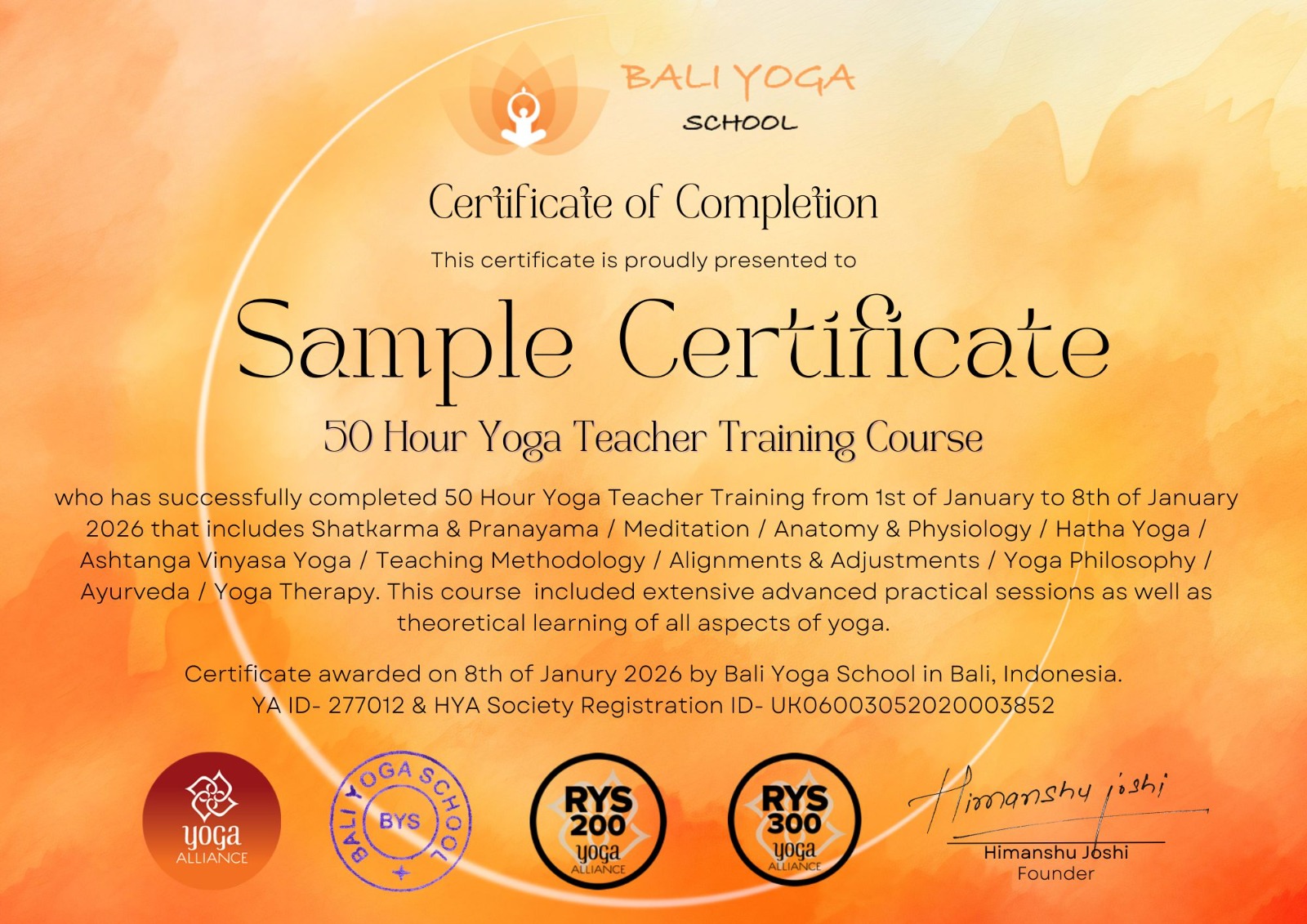
50 Hour Yoga Teacher Training in Canggu Bali - Terms & Conditions
All classes are mandatory only in case of an emergency or illness one can take leave with respected teacher permission. Uninformed leaves won’t be accepted and this will leave bad impression on student monthly performance.
Prerequisites – A high degree of self-motivation is required for all aspects of the course. The practice and especially the teaching of yoga demand a high degree of self-discipline and purity. To ensure the success of the program, participants are required to attend all spiritual activities, meditation sessions, lectures and asana classes. Meat, fish, eggs, black tea, coffee, alcohol, tobacco, drugs and nudity are prohibited during the course as they are counterproductive to the yoga practice. Participants who do not comply with the school rules may be dismissed from the course.
Discipline Rules for Students – Smoking and alcohol are strictly prohibited in the school. If you are having a fast any day, you have to inform kitchen manager for avoiding food waste. Always make discipline, respect teachers and follow all rules. Always be in the time, you are late means will not be permitted to join class. Clear your books of account before departure from Himalayan Yoga Association. Before departure return your books, maps or any goods which you borrowed. Himalayan Yoga Association provides accommodation for a student who join the yoga course. So any friends or relatives will not be included in accommodation however they can stay in school by renting another room. Student have to be present in all scheduled program of Himalayan Yoga Association.
Refund Policy – The course fees & Booking amount will not be refundable, only in the case of emergency students can join us on other schedules. If student cancel the course after joining it, we accept cancellation but course fees will not be refund in cancellation.




